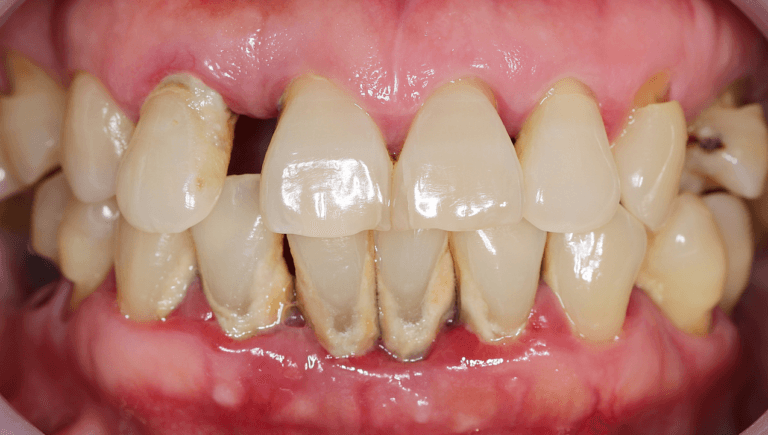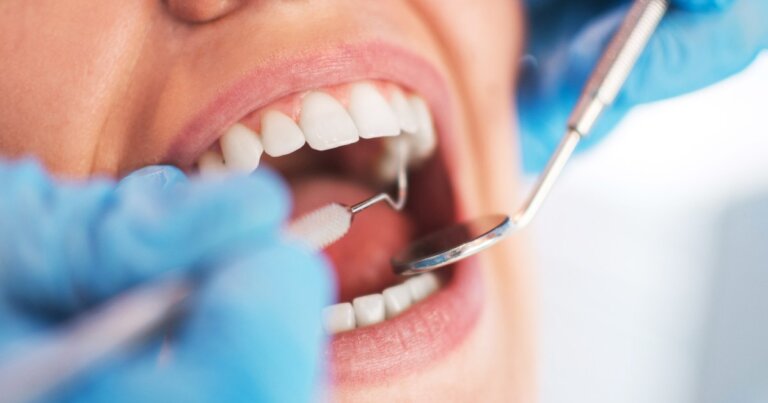Dental Plaque

What Is Dental Plaque?
Dental plaque is a sticky, colorless film that forms on the surface of teeth and gums. It is made up of bacteria and food particles that combine to create a soft biofilm that adheres to the teeth. If left untreated, dental plaque will harden over time to become dental calculus or tartar. It can also lead to tooth decay and gum disease.
Plaque buildup is a common problem, and it can be caused by poor oral hygiene habits, such as not brushing or flossing regularly. Other factors that can contribute to plaque formation include a diet high in sugar and carbohydrates, smoking, and certain medications.
Regular dental cleanings and good oral hygiene habits are important for preventing and removing dental plaque. Brushing twice a day, flossing daily, and using mouthwash can help to keep plaque buildup under control. Before you contact a Toronto dentist to examine the presence of Dental Plaque in your mouth, there are some things you should know as a patient:
- Why Do I Have Dental Plaque?
- Signs And Symptoms Of Dental Plaque
- Treatment Options For Dental Plaque
- How To Prevent Dental Plaque
- Managing Dental Plaque Until You Can See The Dentist
If you have questions about Dental Plaque or other dental problems, please contact us for more information.
Why Do I Have Dental Plaque?
The human mouth is home to a large and diverse community of bacteria, with an estimated total number of bacteria in the mouth ranging from 100 million to 1 billion. However, it’s important to note that not all bacteria in the mouth are harmful, and some can even be beneficial to our oral health. Everyone will develop dental plaque in their mouth. Some individuals develop it faster than others. There are several factors that can contribute to the formation of dental plaque, including:
- Poor oral hygiene: When you don’t brush and floss regularly, dental plaque can accumulate on your teeth. The longer you go without cleaning your teeth, the more plaque can build up.
- Diet: Consuming a lot of sugary and starchy foods can increase your risk of developing dental plaque. These foods can provide the bacteria in your mouth with the nutrients they need to grow and produce more plaque.
- Dry mouth: Saliva helps to wash away food particles and bacteria, so having a dry mouth can increase the risk of plaque formation.
- Medications: Some medications can cause dry mouth, which as we mentioned earlier, can lead to plaque buildup.
- Genetics: Some people may have a genetic predisposition to developing dental plaque. If your parents or siblings have had issues with dental plaque include gingivitis and gum disease, you may be more likely to as well.
- Smoking tobacco: Smoking can increase your risk of developing dental plaque by causing dry mouth, reducing blood flow to the gums, and increasing the production of plaque.
It’s important to note that even with good oral hygiene habits, plaque can still form. That’s why it’s crucial to visit your dentist regularly for dental cleanings and checkups. If you have further questions about Dental Plaque, please contact us.
Signs and Symptoms of Dental Plaque
Dental plaque may not always be visible to the naked eye, but there are several signs and symptoms that may indicate its presence, including:
- Bad breath: The bacteria in dental plaque can produce foul-smelling odors.
- Tooth discoloration: Plaque buildup can cause teeth to appear yellow or brown.
- Tooth sensitivity: As plaque erodes tooth enamel, it can cause increased sensitivity to hot, cold, or sweet foods and beverages.
- Gum swelling, irritation and inflammation: Plaque buildup along the gumline can cause redness, swelling, and bleeding.
- Cavities: Plaque produces acid that can erode tooth enamel and lead to cavities.
- Gum disease: If left untreated, plaque can lead to gum disease, which can cause gum recession, bone loss, and tooth loss.
It’s important to note that not all cases of dental plaque produce noticeable symptoms, which is why regular dental cleanings and checkups are crucial for maintaining good oral health. If you have further questions about the signs and symptoms of Dental Plaque, please contact us.
Treatment Options for Dental Plaque
If left untreated, dental plaque can lead to serious oral health issues such as gum disease and tooth decay. The best way to avoid the negative effects of cumulative dental plaque is to visit your dentist for regular professional dental cleaning. A dental hygienist or dentist will use specialized tools like ultrasonic scalers, hand scalers, and prophy instruments to remove plaque buildup that cannot be removed with regular brushing and flossing.
It is also important to remember that prevention is the best medicine when it comes to dental plaque. Brushing twice a day, flossing daily, and maintaining regular dental checkups can help prevent and treat dental plaque. If you have further questions about treatment options for Dental Plaque, please contact us.

How to Prevent Dental Plaque
Preventing dental plaque requires a consistent and effective oral hygiene routine. Here are some tips to help keep plaque at bay:
- Brush your teeth twice a day: Brush your teeth for two minutes, twice a day using a fluoride toothpaste. This helps remove plaque buildup. We recommend a soft bristle brush like the Curaprox CS5460 Ultra Soft Swiss Toothbrush or an electric toothbrush like the Philips Sonicare Protectiveclean 6100.
- Floss daily: Flossing helps remove plaque and food particles from between the teeth and along the gumline. Take a look at our dental floss oral hygiene guide for tips and tricks.
- Use a tartar-control toothpaste: Using a toothpaste with tartar control properties can help prevent further buildup of dental plaque. We highly recommend Crest Pro Health Gum Detoxify Deep Clean Toothpaste which has a unique formula that penetrates deep into the gums, providing a deep clean that helps to neutralize harmful bacteria and promote gum health.
- Use an antiseptic mouthwash: Using an antiseptic mouthwash can help kill bacteria that cause plaque. We highly recommend a gum care mouth rinse like Crest Gum Care Mouthwash Oral Rinse.
- Use a water flosser: A water flosser is an effective tool for cleaning between teeth and along the gumline. The Waterpik Aquarius Water Flosser is the best all-around water flosser for improving your oral health.
- Quit smoking: Tobacco use can contribute to the development of plaque and other oral health issues.
- Limit sugary and starchy foods: Eating a diet high in sugar and starch can increase your risk of dental problems, including plaque. Try to limit your intake of these foods and opt for healthier options such as fruits, vegetables, and whole grains.
- Drink plenty of water: Drinking water can help wash away food particles and bacteria that contribute to plaque buildup.
- Visit your dentist regularly: Regular dental check-ups and teeth cleanings can help detect and treat dental plaque before it becomes a more significant problem.
By following these tips, you can help prevent dental plaque and maintain good oral health. For more information about how to prevent Dental Plaque buildup, please contact us.
Managing Dental Plaque Until You Can See the Dentist
If you are unable to see your dentist immediately for a professional teeth cleaning, there are steps you can take to manage dental plaque and prevent it from causing further damage. Here are some tips:
- Follow our oral hygiene recommendations on how to prevent further build up of plaque. This includes brushing your teeth twice a day, flossing daily, using a tartar-control toothpaste, using an antiseptic mouthwash, and using a water flosser daily.
- Quit smoking: Smoking can increase your risk of dental plaque buildup, as well as other oral health problems. Quitting smoking can improve your oral health and overall health.
- Dietary changes: Eating a diet high in sugar and starch can increase your risk of dental problems, including plaque buildup. Try to limit your intake of these foods and opt for healthier options such as fruits, vegetables, and whole grains. Additionally, drink plenty of water. Drinking water can help wash away food particles and bacteria that contribute to plaque buildup.
- Chew sugar-free gum: Chewing sugar-free gum after meals can help stimulate saliva production, which can wash away food particles and bacteria.
While these tips can help manage dental plaque until you can see a dentist, it’s important to schedule an appointment as soon as possible to prevent further damage. If you have further questions about Dental Plaque management at home, please contact us.

